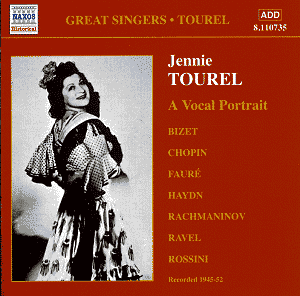

BUY NOW
Jennie TOUREL (mezzo soprano) 1900-1973.
Naxos Historical. ‘Great Singers Series’
Joseph HAYDN (1732-1809).
‘The Mermaid's Song’. [Now the dancing sunbeams play]
‘A Pastoral Song’. [My mother bids me bind my hair]
Gioacchino ROSSINI (1792-1868).
Semiramide, ‘Bel raggio lusinghier’.
Il barbiere di siviglia, ‘Una voce poca fa’.
Fryderyk CHOPIN, (1810-1849)
‘Zyczenie’. [The Maiden's Wish]
‘Moja pieszczota’. [My Joys]
‘Nierna czego trzeba’. [Melancholy]
Georges BIZET (1838- 1875).
Carmen, ‘Habanera’, and ‘Seguidille’.
‘Adieu de l'hôtesse arabe’. Op 21, No.4.
Emmanuel CHABRIER, (1841-1894)
‘Romance de l'étoile’
Gabriel FAURE (1875-1947).
‘Trois poèmes d'un jour’, (Op. 21): a) Rencontre, b) Toujours,
c) Adieu.
Maurice RAVEL (1875-1937).
‘Vocalise en forme de Habanera’.
Reynaldo HAHN, (1875-1947).
‘Si mes vers avaient des ailes’.
Modest MUSSORGSKY (1839-1881).
‘Serenade’. ‘Field-Marshal Death’.
Sergey RACHMANINOV, (1873-1943).
‘Cease thy Singing, Maiden Fair’, (Op. 4, No. 4). ‘In the Silence of the
Night’. (Op. 4, No. 3).
‘Floods of Spring’. (Op. 14, No. 4
Sergey PROKOFIEV (1891-1953).
Alexander Nevsky, ‘Field of the Dead’.
![]() Jennie Tourel
Jennie Tourel
Various orchestras, conductors and piano accompanists. Recorded 1945-1952.
![]() NAXOS 8.110735[74.49]
NAXOS 8.110735[74.49]